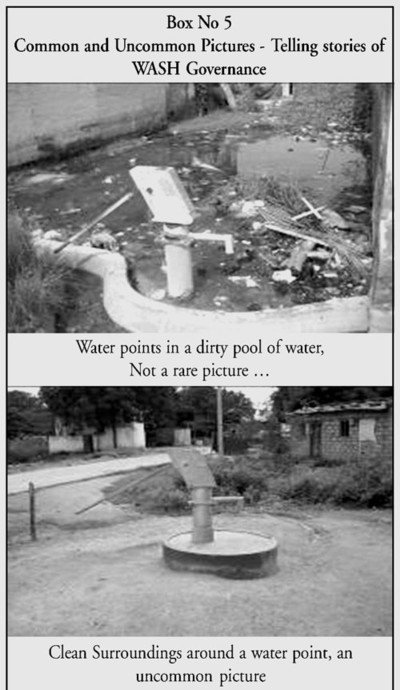Contamination, Pollution and Quality
Prevalence of dental fluorosis and associated risk factors in school children from Kanyakumari district, Tamil Nadu - Paper published in the Indian Journal of Dental Research
Posted on 22 Feb, 2012 01:51 PMA total of 1800 children from all the nine blocks of Kanyakumari district from 6th to 10th standard were examined using type III examination. Dental fluorosis was present 15.8% of the study population and varied from as low as 1.4% to as high as 29.4% in different areas. There was a significant difference in dental fluorosis levels between rural and urban residents.
New water policy more contentious; least helpful in tackling existing issues
Posted on 22 Feb, 2012 12:34 PMAuthor : Dr. Arvind Kumar
How valuable are environmental health interventions? - Evaluation of water and sanitation programmes in India - Paper published in the Bulletin of the World Health Organisation
Posted on 21 Feb, 2012 06:11 PMThe paper informs that a number of epidemiological studies on the benefits of water and sanitation interventions have shown that diarrhoea can be reduced by 30–50%.
An ecological quantification of the relationships between water, sanitation and infant, child, and maternal mortality - Paper published in the Journal Environmental Health
Posted on 21 Feb, 2012 03:30 PMA number of studies have made associations between prevention of disease burden among populations by improving water supply, sanitation, hygiene and management of water resources and between poor water quality and disease burden.
Impacts of climate change on public health in India - Future research directions - Paper published in Environmental Health Perspectives
Posted on 19 Feb, 2012 11:00 PMThis paper published in the journal Environmental Health Perspectives reviews the current state of the science relevant to the 2009 Joint Indo–U.S. Workshop on Climate Change and Health that was held in Goa, India, and, then discusses the observed relationships between climate variability and human health specifically in relation to the Indian subcontinent, highlighting future research directions.
The paper briefly summarises relevant literature on the impacts of climate change in India and touches upon the opportunities and significant challenges associated with designing, initiating, and conducting research, as well as pursuing related public health programming to improve public health infrastructure in the face of climate change. The paper argues that such research is needed to pave the way for unique and pioneering solutions that can improve public health in the face of increasing climate variability.
Understanding governance in WASH sector in Andhra Pradesh - A study by WASSAN
Posted on 18 Feb, 2012 03:38 PMProblems in the water, sanitation and hygiene (WASH) sector have their roots in socio-political issues rather than in technology. This paper presents the report of a survey in 107 villages in rural Andhra Pradesh to illustrate the influence of governance systems.

"Water management in Mumbai: Prospects and challenges" - Videos from a round table organised by Observer Research Foundation
Posted on 16 Feb, 2012 03:51 PMThese four films include details of speeches made by the Municipal Commissioner of Brihan Mumbai Municipal Corporation (BMC), Mr Swadhin Kshatriya, who delivered a valedictory speech and Mr Sandeep Acharya, senior journalist from Loksatta, who expressed his views on the water crisis in Mumbai, as a part of a round table organised by Observer Research Foundation (ORF), on "Water management in Mumbai: Prospects and challenges", on the 10th of January 2010.
Stress of urban pollution on largest natural wetland ecosystem in East Kolkata - Causes, consequences and improvement
Posted on 14 Feb, 2012 10:23 AMThe impact of sewage pollution on these fish ponds and on the ecosystem is evaluated. Similarly, remedial measures to maintain water quality and to improve resource recovery efficiency are suggested.
Marine fisheries in India - Issues, opportunities and transition for sustainable development - A World Bank working paper
Posted on 14 Feb, 2012 10:03 AMThis working paper by the World Bank presents the findings of a study that was conducted as a collaborative initiative by the World Bank and the Department of Animal Husbandry, Dairyin
PSGS invites applications for Smart Pot Water Challenge – Apply by April 2, 2012
Posted on 11 Feb, 2012 09:36 AM![]()

The Patel School of Global Sustainability (PSGS) fosters sustainable urban communities and environments through collaborative research, education and community involvement. Its research generates innovations and new knowledge that will help cities around the world, including those in developing countries, to reduce their ecological footprint, while improving their form and function to make them healthier, more livable and resilient. Through its research, PSGS influences global practice and policy and has become the hub of a global network of sustainability experts.





